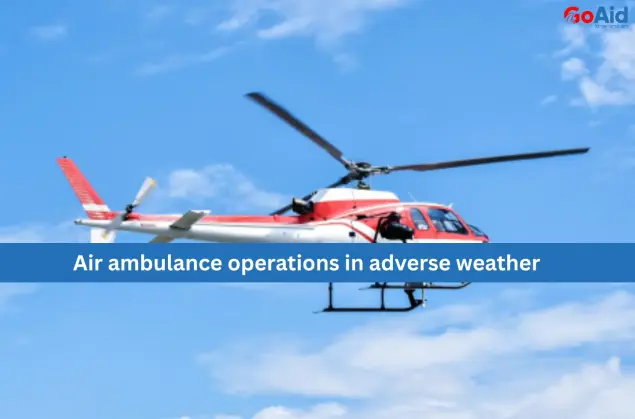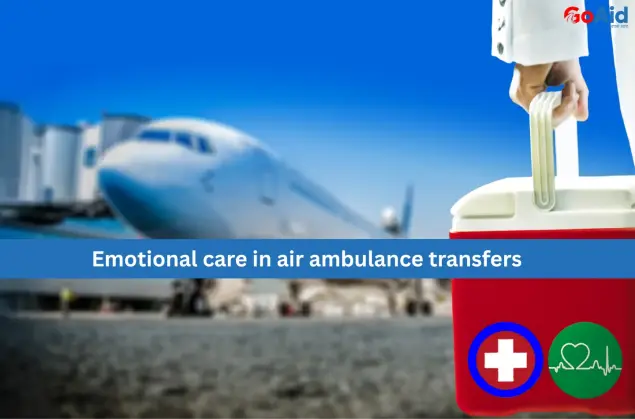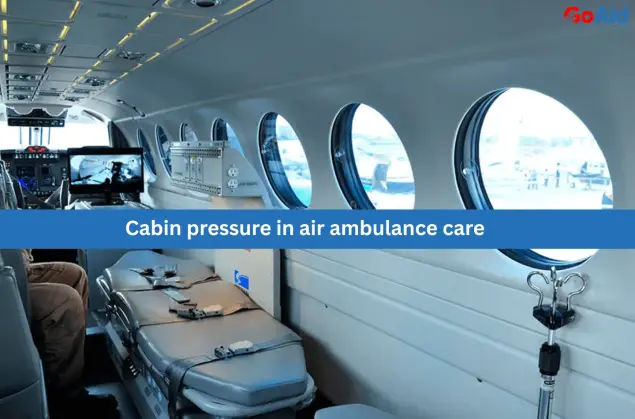.webp)
Air Ambulance for Organ Transport: Speed That Saves Lives
Organ Transport Services By Air in India
Air transport of organs in India is crucial for saving lives, as organs must reach recipients quickly to remain viable. Air ambulances provide the fastest, safest method for transporting organs between hospitals across cities and states.
GoAid offers specialized air ambulance services designed for organ transport, equipped with temperature-controlled storage, ICU support, and continuous monitoring. Their fleet includes helicopters, jets, and fixed-wing aircraft to suit different distances and urgency levels.
Trained medical personnel accompany the organs to ensure optimal handling and timely delivery. By combining speed, safety, and professional care, GoAid ensures organs reach the recipient hospital in the best possible condition, enhancing successful transplant outcomes and saving lives nationwide.
Why is Organ Transport by Air Ambulance Important?
Air ambulances provide fast and reliable organ transport, crucial for patient survival and successful transplants across India.
- Time-Sensitive Delivery
Organs like hearts, lungs, or livers have limited viability. Rapid air transport ensures they reach recipients within critical time windows.
- Maintains Organ Viability
Specialized storage and a controlled environment in air ambulances prevent deterioration. This ensures the organ remains functional for transplantation.
- Reduces Transit Delays
Air transport avoids road traffic, long distances, and logistical delays, allowing organs to arrive promptly at receiving hospitals.
- Supports Multi-City Transfers
Air ambulances can connect donor and recipient hospitals in different cities or states. This makes nationwide organ allocation efficient.
- Professional Medical Handling
Trained paramedics monitor organs during transit, maintaining proper temperature, handling, and emergency care for potential issues.
- Enables Emergency Transplants
Urgent cases benefit from air transport, allowing critical patients to receive organs when immediate action is required.
- Enhances Transplant Success Rate
Faster, monitored transfers reduce organ damage, improving surgical outcomes and patient survival chances during transplantation.
Role of GoAid in Emergency Organ Transfer
GoAid plays a pivotal role in emergency organ transfers. This ensures rapid, safe, and professional delivery to save lives across India.
- Rapid Response Deployment
GoAid activates aircraft and medical teams immediately after organ availability notification, minimizing delays and ensuring timely transfers.
- Diverse Aircraft Fleet
Helicopters, ICU jets, and fixed-wing aircraft are available for different distances and urgency, optimizing speed and safety.
- Temperature-Controlled Storage
Organs are kept in specialized containers with constant monitoring to maintain viability during transit.
- Trained Medical Crew
Experienced paramedics and doctors accompany organs. This ensures safe handling and immediate interventions if needed.
- 24/7 Availability
GoAid operates around the clock, enabling organ transfers at any time without delays.
- Coordination with Hospitals
Communication with donor and recipient hospitals ensures smooth handover and readiness for transplantation.
- Emergency Clearance Support
GoAid handles necessary permissions and clearances for quick takeoff. This reduces administrative delays.
- Optimized Flight Routes
Careful planning of routes minimizes travel time. This ensures organs reach hospitals as quickly as possible.
- Monitoring and Tracking
Real-time updates allow hospitals and families to track organ transport. This ensures transparency and safety.
- Adherence to Safety Protocols
Strict handling, packaging, and transport protocols protect organ integrity and maximize transplant success rates.
Types of Organs Transported Safely by GoAid
GoAid safely transports a wide range of organs across India. This ensures optimal conditions, professional handling, and timely delivery for successful transplants.
- Heart
Hearts require extremely rapid transport due to limited viability. GoAid ensures continuous monitoring, temperature-controlled storage, and a dedicated ICU team during air transfer to maintain organ functionality.
- Liver
Livers are delicate and prone to damage. GoAid uses specialized containers with precise temperature control and trained medical personnel to guarantee safe arrival for transplantation.
- Kidneys
Kidneys can survive slightly longer outside the body, but timely delivery is crucial. GoAid ensures proper storage, oxygenation, and rapid transfer between hospitals.
- Lungs
Lungs are highly sensitive to temperature and handling. GoAid’s advanced air ambulance systems maintain an optimal environment and provide continuous monitoring during flight.
- Pancreas
For diabetic patients or transplant candidates, GoAid transports pancreases securely, using proper cooling and paramedic oversight to maintain viability.
- Corneas
Corneas require sterile conditions and precise handling. GoAid uses specialized containers and expedited air transport to ensure they remain transplant-ready.
- Bone Marrow and Stem Cells
These delicate tissues need immediate and controlled transfer. GoAid ensures proper temperature, sterile containment, and rapid transport to the receiving medical facility.
How Speed and Timeliness in Organ Delivery Save Lives?
The success of organ transplants depends heavily on the speed of delivery. Critical organs like the heart and lungs have very short viability windows. Delays can render them unusable, risking the patient’s life.
GoAid Air Ambulance ensures rapid deployment, minimizing wait times by providing immediate response, optimized flight routes, and professional medical handling. Timely delivery reduces organ damage, maintains functionality, and increases the chances of successful transplantation.
Continuous monitoring by trained paramedics during transit guarantees organs remain in optimal condition.
By combining speed, efficiency, and safety, GoAid significantly improves transplant success rates, giving patients the best chance at survival and better post-transplant outcomes.
ICU and Life-Support Facilities for Organs Transport
GoAid Air Ambulances are equipped with state-of-the-art ICU and life-support facilities to ensure organs remain viable during transit. Temperature-controlled storage systems maintain precise conditions for each type of organ, preventing deterioration.
Advanced monitoring equipment tracks vital parameters such as oxygen levels, temperature, and humidity. This ensures organs are handled under optimal conditions.
Ventilators and portable oxygen systems are available for transporting organs with associated tissue or blood components, requiring stable environments.
Dedicated medical teams onboard supervise and adjust equipment in real-time. Specialized packaging and shock-absorbent containers further protect organs from vibrations and handling impacts. Whether transporting hearts, lungs, livers, kidneys, corneas, or bone marrow, these ICU facilities guarantee maximum preservation.
Continuous communication with donor and recipient hospitals ensures readiness upon arrival. With these comprehensive life-support measures, GoAid ensures timely, safe, and professional organ delivery across cities, states, and international locations, significantly increasing the likelihood of successful transplantation.
Trained Medical Crew Handling Organ Transport
GoAid’s trained medical crew is central to the safe and efficient transport of organs. Each team includes ICU-trained paramedics and doctors with specialized knowledge in organ handling, monitoring, and emergency interventions.
They are skilled in maintaining temperature-controlled conditions. This ensures sterile packaging, and securing organs during takeoff, flight, and landing. Real-time monitoring of vital parameters, including oxygen and temperature, is continuously conducted.
The crew communicates with sending and receiving hospitals to coordinate precise handovers and updates. They are trained to handle emergencies such as equipment failure or unexpected delays. This ensures organs remain viable.
All members undergo regular training in critical care, organ preservation, and safe handling techniques. Their expertise extends to international flights, where additional documentation, customs clearance, and regulations require careful management.
By combining experience, professionalism, and adherence to strict protocols, GoAid’s medical crew ensures every organ reaches its destination safely, efficiently, and within the required time window for transplantation.
Domestic vs International Organ Transfers in India
Organ transfers differ in logistics, cost, and regulatory requirements depending on domestic or international routes.
- Distance and Travel Time
Domestic transfers cover inter-city or inter-state routes and typically take a few hours, whereas international transfers involve longer distances and require careful route planning, often extending flight time significantly.
- Regulatory Requirements
Domestic transfers mainly require hospital and government approvals. International transfers include additional documentation, customs clearance, and cross-border medical certifications.
- Cost Implications
International transfers are costlier due to longer flights, permissions, and specialized staff, while domestic transfers remain more affordable with government-approved rates.
- Medical Support Needs
International transfers may require advanced ICU setups, additional paramedics, and specialized equipment for prolonged flights, whereas domestic transfers may use standard ICU support for shorter durations.
- Coordination Between Hospitals
International transfers need precise coordination between donor and recipient hospitals across countries, including time zone adjustments and real-time updates, while domestic transfers are more straightforward with local hospital teams.
Safety Protocols Followed by GoAid During Organ Transport
GoAid strictly follows safety protocols to ensure organs remain viable during transit. Temperature-controlled containers maintain optimal conditions for each organ type.
Shock-absorbent packaging prevents damage from vibrations or handling. Continuous monitoring of oxygen, temperature, and humidity is performed by trained medical personnel. Sterile handling procedures reduce contamination risk, while backup equipment ensures uninterrupted care in emergencies.
Standard operating procedures are followed for loading, takeoff, in-flight care, and landing. This ensures minimal delays. Communication with hospitals and air traffic authorities ensures smooth, coordinated transfers.
Compliance with government and international regulations guarantees safe transport across domestic and international routes. These protocols collectively maximize the likelihood of successful transplantation and patient survival.
Coordination Between Hospitals for Organ Transfer
GoAid emphasizes seamless coordination between donor and recipient hospitals to facilitate timely organ delivery. Pre-transfer communication ensures the receiving hospital is prepared for immediate transplantation.
Logistics planning includes ground ambulance scheduling, runway availability, and hospital handover procedures. Continuous updates are provided to both hospitals during transit.
Medical staff coordinate with hospital teams to maintain organ viability and ensure proper documentation. Emergency contingencies, such as delays or rerouting, are promptly addressed.
Hospital coordination also involves verifying organ type, recipient readiness, and matching blood or tissue requirements. This synchronized approach ensures a smooth, safe, and efficient organ transfer. This reduces delays and improving the success rate of life-saving transplants.
Conclusion
In conclusion, we have provided you all the details about Air Ambulance for Organ Transport & how speed saves lives in this situation. GoAid ensures fast, safe, and professional organ transfers across India and internationally.
With specialized aircraft, ICU-level equipment, trained paramedics, and strict safety protocols, GoAid maximizes organ viability and transplant success. Efficient coordination with hospitals, temperature-controlled transport, and real-time monitoring guarantee timely delivery for critical patients.
Choosing GoAid provides families and medical teams confidence in emergency organ transfers. This ensures every organ reaches its destination safely and effectively, improving survival rates and saving precious lives.
FAQs
Q1: Which organs can GoAid transport by air?
A: GoAid transports hearts, lungs, livers, kidneys, corneas, pancreas, bone marrow, and stem cells using specialized storage and ICU-equipped aircraft.
Q2: How fast can organs be transported by GoAid Air Ambulance?
A: GoAid ensures rapid deployment with optimized flight routes and 24/7 availability, minimizing time to maintain organ viability and increase transplant success.
Q3: Are trained medical personnel onboard during organ transport?
A: Yes, experienced paramedics and ICU-trained doctors accompany organs, monitoring vital parameters and maintaining proper conditions throughout the flight.
Q4: Does GoAid handle international organ transfers?
A: Yes, GoAid manages cross-border organ transfers, including documentation, customs clearance, and coordination between hospitals for safe international transport.
Q5: What safety protocols are followed during organ transport?
A: GoAid uses temperature-controlled containers, shock-absorbent packaging, continuous monitoring, sterile handling, and backup equipment to ensure safe and viable organ delivery.
Q6: How do hospitals coordinate with GoAid for organ transfer?
A: GoAid maintains real-time communication with both donor and recipient hospitals, coordinating logistics, readiness, documentation, and smooth handover for successful transplantation.




